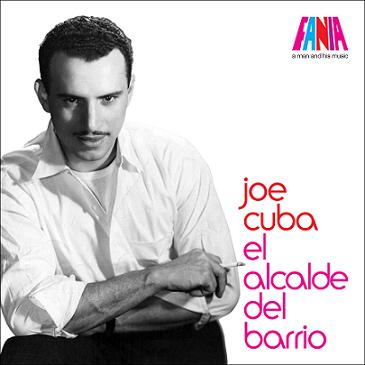The syncopated sounds of the congo, hand claps and guitars — combined with Joe Cuba’s suave vocals — melt hips and hypnotize feet with irresistible dance beats. Known as “sabrosura,” it’s the urge to shimmy and shake your luscious body parts when music with this much flavor hit your senses. The late Latin legend was known as the “father of boogaloo” and a man who melded together genres into one of his own.
Fania Records will release Joe Cuba’s El Alcalde Del Barrio on Thu/11, one year after the iconic musician’s passing, and celebrate with a live performance by Chico Mann at the Elbo Room’s global-funky Afrolicious party. The 34-track box set features digitally remastered recordings never before compiled in album form and include a diverse array of his totally hot hits, from “Bang Bang” to “El Pito (I’ll Never Go Back to Georgia).” El Alcalde Del Barrio or “the mayor of the barrio” refers to Joe Cuba’s pioneering role in the world of modern Latin music and his dedication to keeping it fresh.
Boogaloo was a product of the New York barrios during mid-late 60s when Puerto Rican, Cuban and African American residents began swapping and combining musical stylings with their one another. Boogaloo became the soul behind R&B braided into the saucy rhythms of mambo and Cuban son montuno. Perfectly placed maracas, sweetly clanging bells, saxophone, easy keys and most importantly, a whole host of drums, fuel this genre with unwavering energy.
Joe Cuba, born to his Puerto Rican parents as Gilberto Navarro on April 22, 1931, grew up in Spanish Harlem and became fascinated by the Sabu Martinez’s conga playing. Gilbert learned to play, jamming in the streets with friends until he was asked to step in for his idol, Martinez, for a show in 1950. The name “Joe Cuba” was coined by his publicist and stuck with him throughout his career.
Swooning the Jewish and Italian markets in New York and eventually worldwide, his 1966 hit “Bang Bang” achieved unprecedented success for Latin music in the US, selling over one million copies. In recent years, acts like Chico Mann of New Jersey, the Boogaloo Assassins in LA and DJs Guillermo and Beto in San Francisco have begun playing reinventions of boogaloo sounds, churning out a sort-of renaissance in the genre.
Chico Mann is the brain-child of New Yorker Marquitos Garcia, known for pumping out vintage afro-latino beats that make any dance floor a sexy, sweat fest. Chico Mann will be playing live versions of Joe Cuba songs throughout the CD Release show. The Guardian chatted up the East Coast musician as his plane touched down in SF about his love for old fashion funk and why Joe Cuba would think his music is rad.
On how Chico Mann became identified with the “afro-latino vintage-funk” genre…
I guess I don’t really see it as me playing any particular genre and instead, I’m developing a genre that didn’t exist before, one that’s comprised of multiple musical elements and vocabularies.
On growing up around so many styles of music…
My dad owned a record label in Hell’s Kitchen and so I was constantly around Latin music and living in New York meant I was around freestyle. I was an 80s kid and therefore I love electro and old school hip-hop. All of that informs what I do. So when was I introduced to this music: in the womb.
When did he hear Joe Cuba for the first time?
I don’t even remember. It was just always around.
Why play at the Joe Cuba CD Release?
Wax Poetics pitched the idea and I said yeah—if we can recontextualize his music and pretty much flip it in a whole new way. The Urban Latin roots of what I do are pretty closely connected to Joe Cuba and this was a way to flesh out that tradition. We’re not a boogaloo band, but five different generations of Latin music cooked up into a new music soup.
On how he plans to reinvent Joe Cuba’s songs…
What can I say? We’re sampling Joe Cuba and adapting to its melodic lyrical content. My only worry is that people won’t be able to differentiate between Chico Mann and Joe Cuba— that they wont get the references. Well, I guess that’s not a worry, I just want people to know how much love we’ve put into this. I’m really excited.
What should newbies expect?
One hell of a dance party and I know San Francisco gets down. Whether or not you know Joe Cuba, the energy of the music is so strong. The Latino, afro beat and what I do, it’ll make your ass move. Physiologically your body can’t help but move and react. That’s the sheer beauty of it.
If Joe Cuba would hear Chico Mann…
I’m thinking he would totally appreciate it, considering how he was forging a new sound based on the Cuban musical roots. He blazed that trail. He’s one the earliest pioneers of creating an urban, new york, latin sound. We are very much coming at it at the same level. And he would probably want to take a few solos— we’d make room for a few Joe Cuba congo solos.
And FYI: Bring a voice along with those dancing shoes…
So much of afro-Cuban music is based on call and response. When I sing the call, the group and the audience should both come back with the response. I’ve been trying to stress this on my Facebook and Twitter. When you hear the coro, you gotta come back with the coro. We can all get on the same page— and even if you don’t speak Spanish, phonetically, we can all come together and fully appreciate and understand Joe Cuba’s music and Chico Mann’s music. That would draw the thread.
Afrolicous + Wax Poetics + Fania Records Presents Joe Cuba CD Release Party
Thu/11, 9:30pm, $6/ $8
Elbo Room
647 Valencia Street, San Francisco
www.elbo.com

